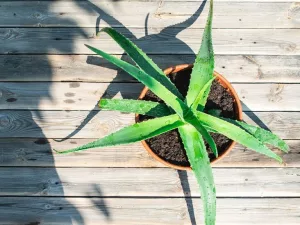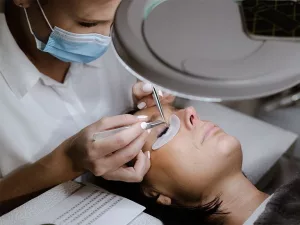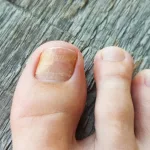Rosehip oil has been used for centuries as a healing remedy and cosmetic ingredient. It is packed with vitamins, antioxidants, and essential fatty acids that help nourish and hydrate the skin. It may also minimize visible signs of aging and aid in fading scars.

Also called rosehip seed oil, it’s obtained from the Rosa canina rose shrub, a plant cultivated primarily in Chile.
Different from rose oil, which is distilled from rose petals, rosehip oil is cold-pressed from the rose fruit and seeds.
Celebrated since antiquity for its restorative effects, rosehip oil delivers skin-benefiting vitamins and essential fatty acids. It additionally contains phenolic compounds that have demonstrated antiviral, antibacterial, and antifungal activity.
Rosehip oil is commonly used as a carrier oil for potent essential oils that are too strong to be applied undiluted to the skin.
Read on to discover how rosehip oil can support your skin and how to incorporate it into your beauty regimen.
1. It hydrates
Proper hydration is vital for soft, pliable skin. Dehydration can become more noticeable in harsh climates or as skin matures.
Rosehip oil contains abundant essential fatty acids, such as linoleic and alpha-linolenic acid. These fatty acids help maintain robust cell membranes so moisture is retained.
The fatty acid profile of rosehip oil makes it an excellent choice for soothing dry, itchy skin. The oil is also readily absorbed, allowing its antioxidants to penetrate deeper skin layers.
2. It moisturizes
Moisturizers help seal in natural hydration and any topical oils you apply.
A study using rosehip powder suggested that rosehips provide multiple anti-aging benefits, including improved skin moisture. Researchers observed that participants who took rosehip powder orally showed measurable increases in skin hydration.
Topical application of rosehip oil may offer similar effects. Rosehip oil is a dry, non-greasy oil, making it a versatile natural moisturizer suitable for most skin types.
3. It helps exfoliate and brighten skin
Gentle exfoliation with rosehip oil can diminish dullness and reveal more radiant, lively skin.
The vitamin A (retinol) content in rosehip oil promotes skin cell turnover.
4. It helps boost collagen formation
Collagen is a fundamental component of skin structure, vital for elasticity and firmness. Collagen production declines with age.
Rosehip oil is abundant in vitamin A, which plays a role in collagen synthesis. Rosehip has also been observed to reduce production of MMP-1, an enzyme that breaks down collagen.
Research supports these effects as well. In a clinical trial, subjects who consumed rosehip powder showed improvements in skin elasticity.
5. It helps reduce inflammation
Rosehip contains polyphenols and anthocyanins, which may help lower inflammation. It also provides vitamin E, an antioxidant known for anti-inflammatory properties.
Because of this, rosehip oil may soothe irritation associated with conditions such as:
- rosacea
- psoriasis
- eczema
- dermatitis
6. It helps protect against sun damage
Decades of sun exposure significantly contribute to premature aging. Ultraviolet (UV) light can also impair the body’s collagen production.
Rosehip oil contains antioxidants like vitamins A and E, which have been shown to work together to counteract visible sun damage and may help prevent photoaging.
Thus, rosehip oil can be used to help mitigate some effects of UV exposure, but it should not replace sunscreen.
Consult your physician or dermatologist about the safe combination of rosehip oil and sun protection in your skincare routine.
7. It helps reduce hyperpigmentation
Hyperpigmentation happens when excess melanin creates dark spots or patches. This can stem from factors such as:
- sun exposure
- hormonal shifts, for example during pregnancy or menopause
- certain medications, including hormonal contraceptives and chemotherapy agents
Rosehip oil is high in vitamin A, which includes retinoids—nutrients known to reduce hyperpigmentation and other visible aging signs with consistent use.
Rosehip also contains lycopene and beta carotene, compounds with skin-brightening tendencies that are commonly included in formulations aimed at lightening dark spots.
Animal research suggests rosehip extract may have pigment-reducing activity and warrants further investigation for human use.
8. It helps reduce scars and fine lines
The essential fatty acids and antioxidants in rosehip oil support tissue and cellular regeneration in the skin. Historically, the oil has been used to promote wound healing and diminish scars and fine lines.
One trial involving rosehip powder reported a meaningful reduction in fine lines around the eyes (crow’s feet) after eight weeks of supplementation. In that study, participants ingested the powder.
In a separate 2015 study, subjects with post-surgical scars applied topical rosehip oil twice daily to their incision sites.
After 12 weeks, those using rosehip oil showed significant improvements in scar coloration and inflammation compared with the untreated group.
9. It helps boost immunity
Rosehip oil is rich in antioxidants and polyunsaturated fatty acids like linoleic acid, which help prevent the degradation of cell membranes in the skin. Healthy, intact cells serve as a barrier to block bacterial invasion that can lead to infections and breakouts.
Both animal and human studies of rosehip powder have suggested it can strengthen and prolong the vitality of skin cells. Rosehip powder has also been shown to reduce MMP-1 production, the enzyme that degrades structural components like collagen.
How to use rosehip oil
Rosehip oil is a lightweight, fast-absorbing oil.
While generally tolerated by most skin types, perform a patch test before first-time use to ensure you do not have an allergy.
To perform a patch test:
- Place a small amount of rosehip oil on your forearm or wrist.
- Cover the area with a bandage or gauze.
- Wait 24 hours, then inspect the skin for irritation.
- If the area is itchy or inflamed, avoid using rosehip oil (contact your doctor if symptoms persist).
- If there is no reaction, it should be safe to apply elsewhere.
After a successful patch test, you can use rosehip oil up to twice daily. It can be applied alone or mixed with another carrier oil or your preferred moisturizer.
Rosehip oil can spoil relatively quickly. To prolong its shelf life, keep the bottle in a cool, dark location or store it in the refrigerator.
Although pricier, cold-pressed, organic rosehip oil is recommended for purity and optimal benefits.
Popular options include:
- Radha Rosehip Oil
- Kate Blanc Rosehip Seed Oil
- Majestic Pure Cosmeceuticals Rosehip Oil
- Life-Flo Organic Pure Rosehip Seed Oil
- Teddie Organics Rosehip Oil
Possible side effects and risks
Although generally safe for most people, allergic reactions to rosehip oil can occur. Always do a patch test before broader application.
Consult your doctor if you develop:
- red, itchy skin
- watery, itchy eyes
- a scratchy throat
- nausea
- vomiting
In severe allergic reactions, anaphylaxis may occur. Seek emergency care immediately if you experience:
- breathing difficulties
- wheezing
- swelling of the mouth, throat, or face
- a rapid heartbeat
- severe abdominal pain
The bottom line
Rosehip oil has a long-standing reputation as a therapeutic and cosmetic oil. It’s rich in vitamins, antioxidants, and essential fatty acids that are valued for nourishing the skin.
Scientific evidence supporting rosehip’s benefits makes it an appealing option for those aiming to lessen visible aging, fade scars, or enhance their skincare routine. It’s relatively affordable, easy to use, and generally considered safe for most skin types.

























Leave a Reply
You must be logged in to post a comment.